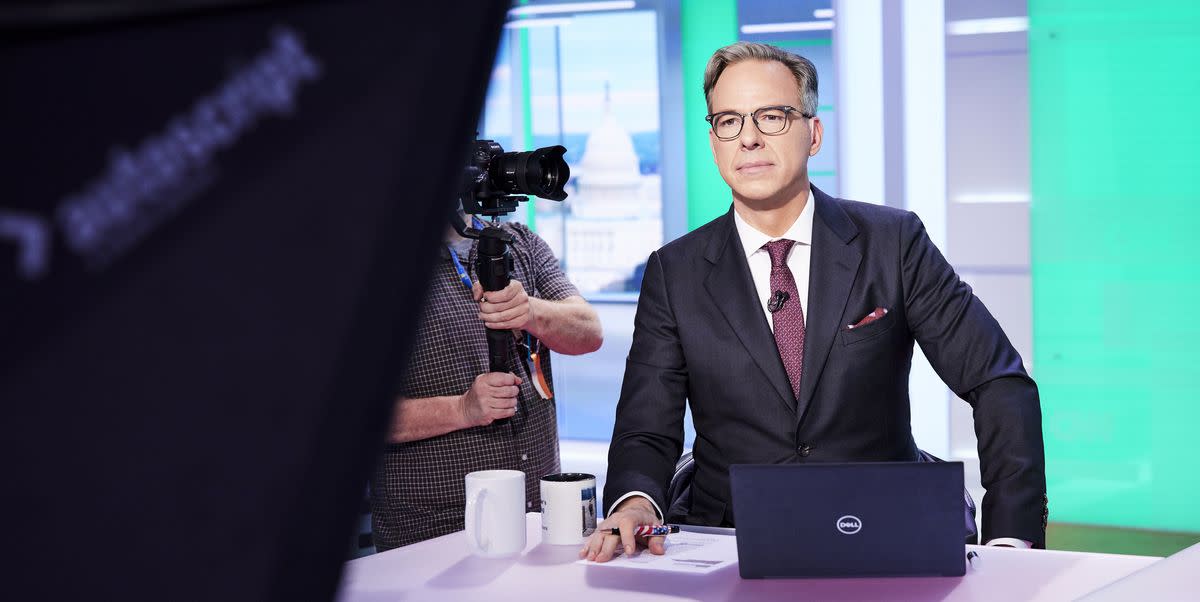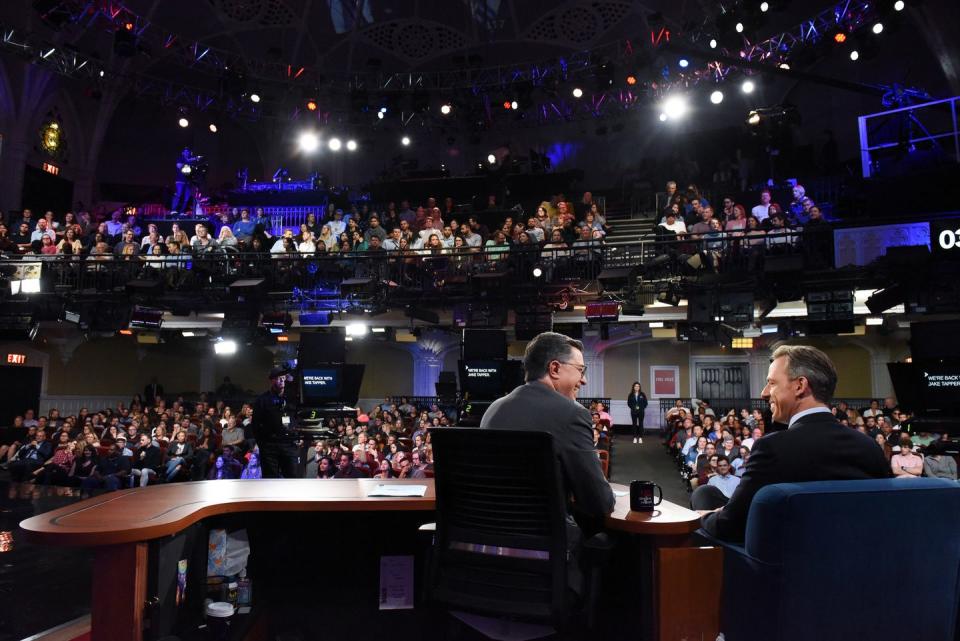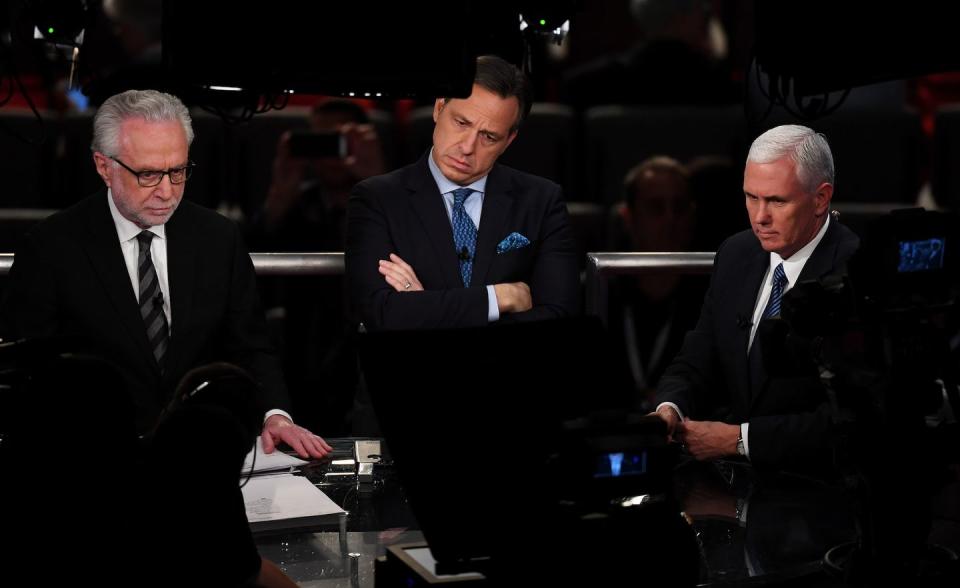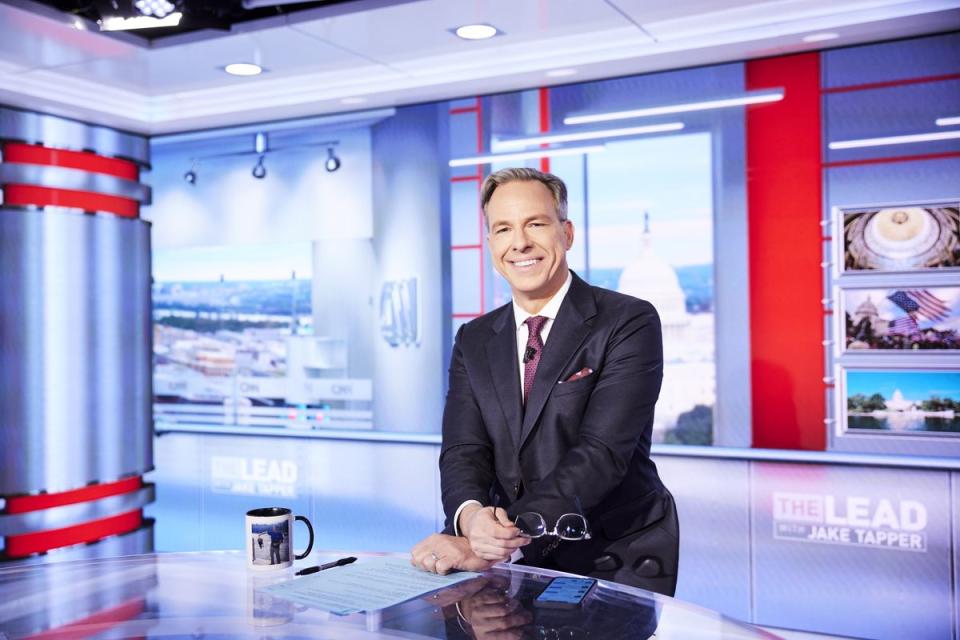Jake Tapper Knows There's No Such Thing As Purely Objective News

- Oops!Something went wrong.Please try again later.
Jake Tapper is what they used to call a newsman, and he is determined to stay that way in an era when he believes people "are being conditioned to run to ideological or partisan media, where there's a tribe and a built-in support network. And that's not what we do here." The "here" there is The Lead on CNN, the show he's hosted for 10 years as of this Saturday. In that time he's covered the Boston Marathon bombing and January 6 and everything in between, often live. He's interviewed presidents and took the reins of a Sunday show, State of the Union. He's had a front-row seat to the Trump years, some seismic shifts in media and journalism, and a number of changes in ownership at CNN.
In the interview below edited for length and clarity, he spoke on much of the above, as well as whether being "objective" is a priority for him as a journalist, whether a news outlet has an obligation to appeal to people across the ideological spectrum, and what it's like to have someone tell you they do coups on air.
Do you remember a day when the show really found its footing?
Within the first few weeks, the Boston Marathon bombing tragedy took place. And we went up pretty immediately. I don't know about finding its footing, but we were thrown into this evolving news story and there was a manhunt going on. I have very vivid memories of that night. I wouldn't say that was the show finding its footing, because it was the middle of the night. It wasn't The Lead, but it was certainly a time that I really felt that I was part of CNN and part of a breaking news organization, which is very different from my previous job at ABC News, which was a great news organization, but not 24/7.
What's your process for making the show each day? Has that evolved over the 10 years?
It's just a constant conversation about things that are interesting in the news, and should we cover them, how do we cover them? It's an evolving process, because I remember when I was at ABC, the 6:30 newscast is going to be locked unless there's some really big story. At CNN, it's a different metabolism. You're constantly evolving and changing what's in the show, because people are coming to you for breaking news. So even while we're on air, there might be breaking stories. There'll be breaking news in two different court cases that we're waiting for, Michael Cohen and Paul Manafort or something like that. It might happen at the same time.
That interview where John Bolton just admitted to you on air that he's planned coups was remarkable. Can you think of other moments where you were interviewing someone and you were amazed that they just said that on television?
Oh, boy. Well, it happened a lot more during the Trump years, obviously, just because of the nature of that administration. Kellyanne Conway, Steven Miller on State of the Union. January 6, interviewing members of Congress while they were—remember Congressman Michael Gallagher telling me that he hadn't seen anything like what he was seeing since he'd been in Iraq?
I've noticed over the years that British presenters usually tend to press their subjects harder, or at least longer, when they refuse to answer a question than sometimes we see on American TV. Do you think there's any truth to that as a cultural distinction in broadcasting?
I don't know that I agree with that. The last time I interviewed Donald Trump, I asked, I don't even know, dozens of follow ups on whether or not saying that Judge Curiel couldn't do his job because of his Mexican heritage was the definition of racist. I certainly see those clips where British interviewers can be quite insistent, but I see that with American interviewers, too. It's just the ones that we see from British interviewers tend to highlight that. I watch enough BBC to know that that's really the exception, not the rule.
I happen to also be talking to Kal Penn this week, who's guest hosting The Daily Show, and I'm reminded of times where you would play a clip that was particularly absurd and react to it with bemusement in a way we might associate with Jon Stewart. Do you think there was any blending of the two genres, especially in the Trump years, because of how absurd reality started to become?
I think it dates back to the Bush years, really, and the emergence of Jon Stewart as somebody who would use clips effectively, probably more effectively than TV news people were using at the time. I was at ABC thinking what a great research team he had, and why wasn't everybody doing that? I think he was very influential on the TV news business in that sense. I don't know that his interviews were like that, but I think his use of video and showing what people had said in the past that might contradict what they're saying now was effective.
I guess I would say that there is a blending in two ways. I don't think I'm part of that blending, but I would say that first of all, comedy has become more political. You see the late night shows, obviously The Daily Show, Bill Maher, John Oliver, Jimmy Kimmel, Stephen Colbert, Seth Myers. They talk much more about politics than I think their predecessors did, whether Jay Leno or Johnny Carson or David Letterman.

And then two, and I would exempt CNN from this, but I do think that there has been on cable, not including CNN, a rush toward opinion journalism and those other networks making a business decision to try to win people based on political beliefs instead of just doing straight news broadcasts. And I think in that sense there has been kind of a confusion and conflation about all of it. I don't really think that I'm part of that. If I have a bemused expression on my face every now and then, it's just because I have an honest face and I might actually just be bemused.
For years, Jon Stewart would say cable news networks like CNN are great at covering these sprawling breaking news events, but in order to fill the hours, they can turn to the business of generating conflict. Do you think that that was ever a fair critique, including of CNN?
Yeah, probably like more than a decade ago. CNN Crossfire was based on conflict. I don't think it was a bad idea, but it was based on debate. And then I think there have been in the past on cable writ large. There are stories that are just there and the way they're framed to outrage their viewers. And sometimes that outrage is not based on a fair and honest coverage of the story that we see. But I don't think we do that at CNN. I think that we cover stories that are outrageous when they're legitimately outrageous. But we use a lot of our time to cover stories that other people are not covering. If you watch my show, you'll see stories from Ukraine that our competitors are not covering, stories from all over the country that our competitors are not covering. I could, if I wanted to, do what I've heard people refer to as cable catnip stories, which is just, here's this outrage, real or not, and let's just debate it and get our viewers to hate somebody. And I don't find that particularly illuminating or newsworthy.
You mentioned other outlets have turned towards partisan programming. Do you feel like a news network has a responsibility to try to appeal to people at all points of the political spectrum?
Certainly not all points of the political spectrum, because that would include a whole bunch of people that believe things that are not true or hateful. But I think the point of news is just to provide information, regardless of who it is good for or bad for. So if Los Angeles Mayor Eric Garcetti's nomination is in trouble because of allegations that he knew of a sexual harasser in his office, that is news. And if he's losing Democratic Senate votes because of those allegations, which those Democratic senators find credible, that is news. And it is the responsibility of every channel to cover that, even if it's bad for President Biden. [After our interview, Garcetti got over the line with the help of some Republican votes.] Likewise, if there is news that is bad for former President Trump, it is a responsibility of every news channel to cover that. Such as, he lost the election. And yet I don't think that everybody is trying to do that. Certainly not in the case of what we're seeing in the Dominion lawsuit filings.

Is the concept of being "objective" as a journalist a priority for you? Is it how you look at the job?
I think it's always an interesting debate because obviously no human being is purely objective. We all carry with us the biases of our lives and our experiences. But that said, my show is not about my views. My show is about the news. I have a staff that is diverse in all sorts of ways. They're all super smart and talented, but they come from different walks of life and they all have different things that they're looking at and stories that they think are important. And I think it's important to reflect all of that. And when we have a panel, we want to make sure that there are conservatives, we want to make sure that there are progressives. We want to have a debate.
But that doesn't mean we shouldn't be trying to be the most fair news show that we can, presenting the news in as accurate a manner as possible. I mean, I see clips from other channels in which they're describing American politicians in the most pejorative ways possible, not based on descriptions of what they're doing, but just based on trying to create enemies. That is a business model, and no doubt it's a successful one, but it's not news.
Yeah, I just think of even a mundane example, like you're assessing a budget proposal. You're deciding which think tank you want to talk to. Do you think that that in itself involves a bit of an opinion?
Obviously the credibility of different people that you have on is something that's important to assess. It's also important to disclose to viewers, if we quote an economist who endorsed Senator Warren's presidential campaign, is it not important for us to mention that this is a progressive economist? I think it is. That doesn't mean that his facts are different or wrong. If he's giving an analysis, not stating facts, it's important to include. Same thing with if we have Doug Holtz-Eakin on, who was an advisor to the McCain campaign way back when. If we're offering analysis from a think tank, we should disclose if the think tank leans one way or the other. But that doesn't mean that we're saying don't believe this person. We're just saying you should be aware that this think tank is center left or whatever. There's no such thing as a purely objective news report in any sense. The point is we're supposed to try.
In your time at CNN, it's changed ownership structures in a number of ways and a number of times. Have you ever felt that who owns CNN has affected what CNN does?
Never. When I started, we were owned by Time Warner. Then we were owned by AT&T. Now we're owned by Warner Bros. Discovery, and it hasn't affected anything.
Do you have any concerns about how so many of our news outlets are owned by relatively few big companies?
I mean, it wouldn't be my first choice if I were king, but I'm really much more concerned with the fact that even the attempt to be remotely objective is falling by the wayside among journalistic organizations who are supposed to be trying to be fair. I don't begrudge National Review or Mother Jones for having ideological points of view. That's their purpose, and they are great at it, and they fulfill that. But I'm talking about news broadcasts that are supposed to be trying to present the news in as fair and honest a way as possible. And yet when you turn them on, you're not getting the news. You're getting a lot of opinions and a lot of unfair coverage. I don't think, because Vanity Fair is owned by Conde Nast, that the Newhouse family has undue influence and is keeping [someone] from writing stories that they want to write.
Do you feel like anything changed in how the media covers politicians and what they say since 2016, in the age of shamelessness? Has your approach changed, in terms of your willingness to just say "that was a lie"?
I'm probably more willing to say, "That's not true," not, "That was a lie." Lying is a word that implies knowledge that the person is saying something not true. But it's probably because former President Trump was so willing to say things that weren't true. And our current president is also pretty fast and loose with facts on occasion, especially when he's recollecting something.

The moment things changed for me was probably when then-candidate Trump was attacking Ted Cruz, alleging that Ted Cruz's father had played some role in the Kennedy assassination. That might have been the first time I really did one of these analyses in which I just called out the lie, defending Senator Cruz. But I think that it was just such a shock to the system that somebody would cite the National Enquirer with this crazy story about Raphael Cruz and the JFK assassination. And I think that moment probably changed things for me, because before that, politicians could get dirty and there would be insinuation and innuendo, but there was always at least some semblance of being in the neighborhood of a fact. And here we were in completely uncharted waters. And I think that moment really opened my eyes as to, wow, this guy's really willing to say anything. I realized we were in a new era when it came to saying things that weren't true.
If we look at the next 10 years of The Lead, how do you deal with the tectonic shift we're seeing towards digital consumption of information, and how younger viewers aren't coming to linear TV for their news?
Well, the longer-term solution I will leave to my overlords at Discovery, Warner Bros, and CNN, but it is something I am very aware of. When I started in journalism, my second job was at Salon.com, and so I was online before major news organizations were, or if they were, they were only updating every morning. They weren't updating throughout the day. So I'm very aware of how slow big media companies can be to adapt, and also the need to do so.
We post every segment of the show on Twitter, we pick three or four segments to post on Instagram and Facebook, we put our show out there every day as a podcast. I have a young staffer named Michael, whose last name I won't give because I don't want people to harass him. He wanted me to do TikToks, but there were so many national security experts who told us to get rid of TikTok. Now we just do it on Instagram, but we do little behind-the-scenes videos. I have a 13-year-old and a 15-year-old, and I know they're not watching TV at all. They're watching YouTube, they're on Instagram and TikTok, and that's where they're getting their information. And I know that we need to meet people there, too. So I don't know where we're going to be in 10 years. I'm hopeful that there will continue to be a need for news where you don't necessarily know how the person anchoring the show is going to vote.
You Might Also Like

